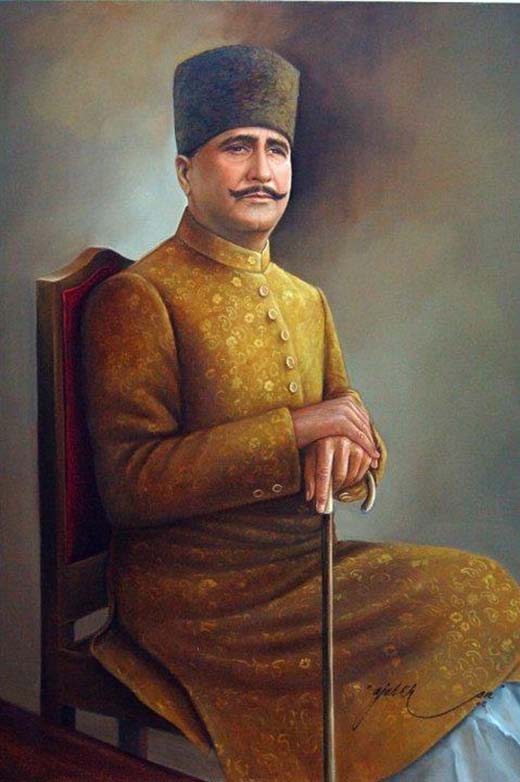Mir Liyaqat Nazir
 The autocratic Dogra regimes and their theatres of oppression, agony and injustice define their fist rule in Kashmir. During those days the denial of justice and choice were not only expressed and broadcasted on the political podiums but also echoed in the oeuvre of great Allama Iqbal. In fact he is considered to be the first major literary figure from the sub continent who became voice to the voiceless people of Kashmir. The way he articulated their sentiment and foregrounds, the political uncertainty, the rich heritage, saga of suppression and their helplessness shows his concern and love towards a land he had roots in. For him Kashmir remains an alter ego and whether he lived in Lahore or Sialkot, England or Germany; he would always hold his head for Kashmir and would highlight the rights of Kashmiris in his poetic endeavors and speeches. He was the instrumental in setting up Anjuman-e-Kashmiri Muslimanan-e-Lahore, a platform from where Allama used to fight for the rights of Kashmiri’s. He wrote many poems dedicated to the people of Kashmir who face the travesty of justice and tyranny, both in autocracy and democracy. There is one such short poem in the anthology of Armaghan-e-Hijaz (The Gift of Hijaz) that epitomizes the wounded symbiosis of past and present.
The autocratic Dogra regimes and their theatres of oppression, agony and injustice define their fist rule in Kashmir. During those days the denial of justice and choice were not only expressed and broadcasted on the political podiums but also echoed in the oeuvre of great Allama Iqbal. In fact he is considered to be the first major literary figure from the sub continent who became voice to the voiceless people of Kashmir. The way he articulated their sentiment and foregrounds, the political uncertainty, the rich heritage, saga of suppression and their helplessness shows his concern and love towards a land he had roots in. For him Kashmir remains an alter ego and whether he lived in Lahore or Sialkot, England or Germany; he would always hold his head for Kashmir and would highlight the rights of Kashmiris in his poetic endeavors and speeches. He was the instrumental in setting up Anjuman-e-Kashmiri Muslimanan-e-Lahore, a platform from where Allama used to fight for the rights of Kashmiri’s. He wrote many poems dedicated to the people of Kashmir who face the travesty of justice and tyranny, both in autocracy and democracy. There is one such short poem in the anthology of Armaghan-e-Hijaz (The Gift of Hijaz) that epitomizes the wounded symbiosis of past and present.
Aaj who Kashmir hai mehkoom-o-majboor-o-faqeer (Today that Kashmir, under the clutches of enemy, has become weak, helpless and poor), Kal jise ahl-e-nazar kehte thay Iran-e-sagheer (Once known in the world among the wise as mini Iran) (Armaghan-e-Hijaz-24).
The short poem unlike others in the anthology unfortunately begins with the continuous agonizing state of siege and its tragic aftermaths like bloodshed, humiliation, poverty in a land once known as the mini Iran because of its peace, culture and genius literati. The second couplet is a sordid cry as well as deep lamentation from the heavens when the tallest leaders representing the aspirations of the people sold the truth, and dreams for the sake of power. The third couplet is kind of Marxism outcry when the poor farmers of valley living in the hinterland and mountains narrate their woeful tales of grief instead the songs of harvest. The last couplet is both an invocation as well as complaint to Almighty Allah that how long these poor skillful hands, genius minds, pure breed, living in the mountains have to wait for justice. But the poet is optimistic that one day the dream of enslaved people’s will come true, the world will see the scenes of tremors and convulsions when the towers of oppression will fall.
In the anthology of Armaghan-e-Hijaz (The Gift of Hijaz), Allama Iqbal was more pragmatic than idealistic and that’s why he touches every issue which has preoccupied his mind during his last phase of life. Iqbal is not among the philosophers who get engulfed in abstract concepts and theories and engage themselves only in the superfineness of linguistic and logical excellence. The above poem is both literary achievement as well as a prelude of a resistance moment which finally force the autocrat regimes to hand over power to the people. As we are observing the 77th death anniversary of Dr Allama Muhammad Iqbal, we should read him and disseminate his ideas otherwise if the strings are loose in the instrument then the songs of passionate heart can’t be sung.
A fresh breeze may come from Hijaz – or may not!
The days of this poor humble man are ended;
Another knower of secrets may come – or may not!
The author is research scholar of resistance literarture at Pune University.














